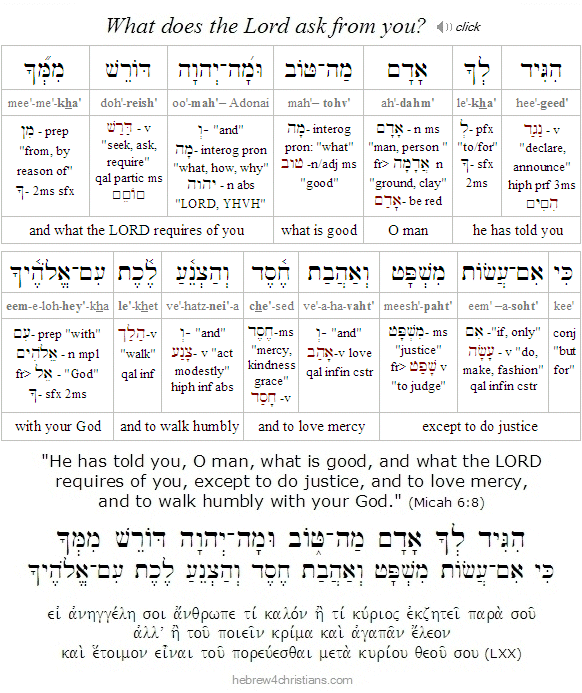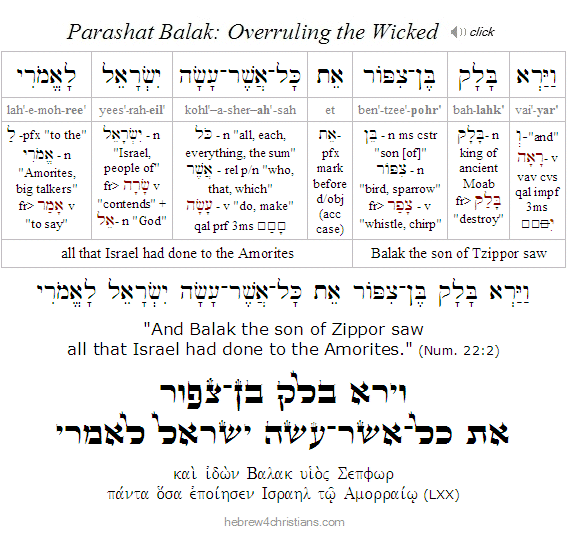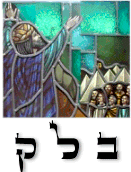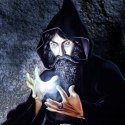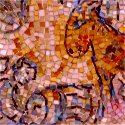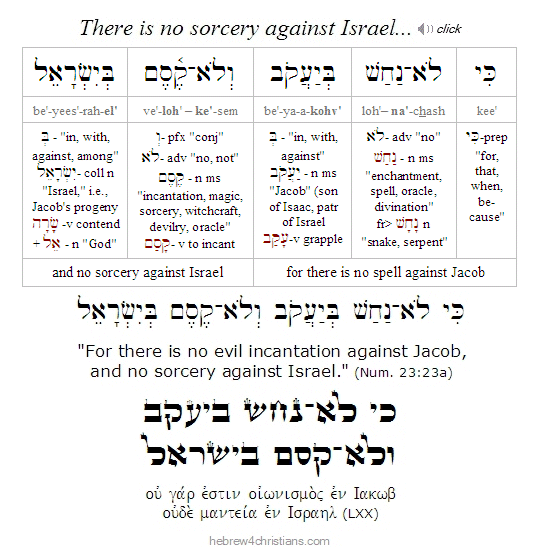|
|
 |
 |
 |
 |
|
Weekly Torah Reading
|
|
|
|
Parashat Balak ("Devastator")
|
|
|
Click on the links to display the Scriptures:
|
|
|
|
 |
 |
 |
|
Torah Reading Overview
|
|
|
|
Last week's parashah (i.e., parashat Chukat) recounted how Sihon, the king of Amorites, and Og, the king of Bashan, tried to prevent the Jewish people from passing through their borders to get to the Promised Land. Both kings decided to wage war against Israelites, and both were decisively defeated.
This week we find Israel encamped near the borders of Moab, east of the Jordan, finally ready to enter the Promised Land. When Balak, the king of Moab, considered what Israel had done to the Amorites, however, he sought the aid of the neighboring Midianites and sent emissaries to hire an Aramean "seer" named Balaam to curse Israel so that they would be defeated in the forthcoming battle.
The parashah begins:
|
|
|
 |
 |
|
And Balak the son of Zippor saw all that Israel had done to the Amorites. (Num. 22:2)
|
 |
 |
|
Who was Balak? (בָּלָק)
|
 |
 |
|
Recall that Abraham's nephew Lot was rescued from the destruction of Sodom and Gomorrah along with his two daughters. After fleeing the area, they took shelter in a cave, when the two daughters got their father drunk, had sexual relations with him, and became pregnant. The two sons born from this incestuous union would become fathers of the nations of Moav (Moab) and ben-Ammi (Amon), respectively.
When the Moabites heard about the defeat of the Amorite kings Sichon and Og, they decided to join forces with their longtime enemies the Midianites in order to present a united front. The Moabites then installed a new king, Tzur of Midian, who was renamed Balak. Perhaps the Moabites chose a Midian king because Moses himself lived there for many years with Yitro.
|
|
|
 |
 |
|
King Balak was a magician, trained in kishuf (the occult and magic). Instead of preparing for a conventional war, however, he hired the services of a renowned magician named Bil'am son of Beor ("Balaam"). His plan was to fight Israel by means of spiritual powers. Perhaps he thought that if he and Bil'am combined their powers, they could defeat Israel.
|
|
 |
 |
|
Who was Balaam? (בִּלְעָם)
|
 |
 |
|
Balaam son of Be'or was from Aram (ancient Mesopotamia/Syria), the place of Abraham's extended family. Similar in notoriety to the rasha Haman in the book of Esther, Balaam is considered one of Israel's greatest foes. His name Bil'am may mean "not of the people," a "mad man," or a "corrupter of the people." According to Jewish tradition, Jacob's wicked uncle Laban had a son named Beor (בְּעוֹר) who became the father of the Balaam (בִּלְעָם). In other words, the "cursing prophet" Balaam was none other than the grandson of Laban and therefore a distant relative of the Jewish people:
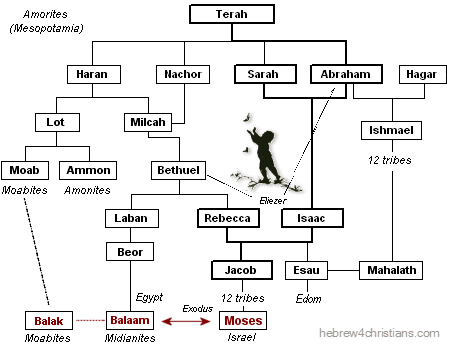 |
Note that the name "Beor" first appears in connection with a king of Edom (Gen. 36:32), which suggests that Balaam might have once been a king of the Edomites (descendants of Esau). Note, however, the phonetic similarity to Peor. If Beor and Peor are the same, then Balaam was actually a prophet of Baal Peor, a local Semitic god.
Balaam was regarded as a great seer, magician and an adept in the occult. He had an "evil eye" and drew the spirit of demons to anything he gazed upon (Avot 5:22). His notoriety made him famous, and powerful people asked him to invoke curses on their enemies. The Talmud (Sanhedrin 106a) states that Balaam became so famous as a magician that he later became a chief advisor to Pharaoh. It was Balaam who advised the new Pharaoh to enslave the Israelites and to afflict them with brutal taskmasters (Exod. 1:8-11). For more information about the identity of Balaam, see the entry entitled, "The Curses of Balaam."
The text implies that Bil'am had some real knowledge of the God of Israel. But why did the LORD give him the gift of nevu'ah (prophecy)? According to some of the sages, the LORD allowed him to become a navi (prophet) so that the nations could not make the claim, "If God had given us a prophet as great as Moses, we would also have served the LORD." Bil'am is also an object lesson to all those who attempt to manipulate the LORD for the purposes of evil (he was later killed by Yehoshua when he tried once again to curse the people of Israel). King Balak sought him out because he (mistakenly) thought that this prophet could somehow manipulate the LORD to turn against His people.
According to the Talmud (Berachot 7a), Bil'am knew the moment each day that the LORD was angry at the world. If he could curse someone at just that moment, God would be constrained to say "Amen" to the curse.
|
 |
 |
|
Balak sends messengers to Balaam
|
 |
 |
|
Balak dispatched a group of noblemen from both Moab and Midian to invite Bil'am to curse the Israelites. Initially he refused to go with them, since he did not have the permission of the LORD. However, after repeated delegations and a warning from the LORD, he saddled his donkey and made his way to curse God's chosen people.
|
|
|
 |
 |
|
The willingness of Bil'am to curse God's people made the LORD angry. On the way to perform his maledictions, delicious irony ensues. Bil'am is berated by his donkey, who saw the Angel that the LORD sent to block their way. The so-called great man could not control his own donkey with his words; how would he then be effectual in cursing Israel?
|
|
 |
 |
|
The Talmud (Sanhedrin 105a) states that Bil'am was actually made lame when his foot was crushed against wall as his donkey lurched the second time to avoid the Angel. Nevertheless, the LORD let him proceed on his mission, but only on the condition that he would speak exactly what He commanded him to speak.
|
 |
 |
|
Curses turned to Blessings
|
 |
 |
|
Balak received Bil'am at Moab's border and repeated his promises of honor and glory, but Bil'am reiterated that "The word that God places in my mouth, that I will speak." Three times, from three different vantage points, Bil'am attempted to pronounce his curses; but each time blessings upon Israel were recited instead. The third attempt was at the summit of Peor itself, the place noted for Baal worship. The Ruach Hakodesh came upon Bil'am and he recited further blessing upon Israel and (ironically) curses upon her enemies. Part of Bil'am's blessing is now part of the daily morning service (Mah Tovu).
Finally, the exasperated king wanted to rid himself of Bil'am, but Bil'am then prophesied concerning the acharit hayamim (end of days). According to Maimonides, Bil'am's prophecy concerned "two anointed ones" of Israel, namely, King David and the Mashiach:
In the story of Bil'am is it spoken of, and there it is prophesied on the two "anointed ones": the first Mashiach, which is David, who saved Israel from its enemies; and the last Mashiach, who shall be of his descendants, who will save Israel in the end. There he says: "I see him, but not now"-- this is David; "I behold him, but he is not near"-- this is the King Mashiach; "There shall shoot forth a star out of Jacob"-- this is David; "And a scepter shall rise out of Israel"-- this is the King Mashiach; "And shall smite the corners of Moab"-- this is David, as it is written (II Samuel 8:2), "And he smote Moab, and he measured them with a line"; "And rule over all the children of Seth"-- this is the King Mashiach, as it is written (Zachariah 9:10), "And his dominion shall be from sea to sea"... (Mishneh Torah)
|
 |
 |
 |
 |
 |
 |
|
The Apostasy at Peor (פְּעוֹר)
|
|
|
|
According to the Talmud (Sanhedrin 106a), when Bil'am saw that he could not prevail against Israel by his words, he devised a different strategy to defeat them. He advised Balak to erect tents near the Israelite camp (then at Shittim), and to seat old women in their doorways to sell linen garments to the Israelites. The old women lured the men inside the tents, where the young women of Moab awaited them, adorned and perfumed. The women of Moab tempted the Israelites to join in the worship of "Ba'al Peor" and to participate in idolatry and immorality. Thus Bil'am at last succeeded in cursing Israel....
In punishment for their idolatry, a plague broke out and the LORD commanded Moses to impale (literally) the ringleaders. Before the order was carried out, however, a high-ranking Israelite (Zimri) publicly took a Midianite princess into a tent set up near the Mishkan. Pinchas (Phinehas), the grandson of Aaron, took up a spear and impaled them both, thereby stopping the plague raging among the people. Nonetheless, Israel's first encounter with Ba'al was disastrous, and 24,000 of the Israelite community died.
|
|
|
Balaam the Bizarre...
|
|
|
|
Balaam is mentioned no less than fifty-one times in the Scriptures, beginning with the account given in Parashat Balak (Numbers 22-24). He was later killed in a battle between Israel and the Midianites (Numbers 31:8). He is also mentioned in Deut 23:5-6; Joshua 13:22; 24:9-10; Micah 6:5; and Nehemiah 13:2.
Although at first glance Bil'am might appear to be a man of God, a true prophet, both the Scriptures and Jewish tradition are emphatic that he was an adversary of the LORD and an enemy of the children of Israel. His so-called sorcery led to folly and death. The New Testament Scriptures speak of "the way of Balaam, the son of Beor, who loved gain from wrongdoing" (2 Pet 2:15), "Balaam's error" (Jude 1:11), and "the teaching of Balaam, who taught Balak to put a stumbling block before the sons of Israel" (Rev 2:14).
Perhaps paradoxically, or at least ironically, the blessing that Bil'am was constrained to confess over Israel was integrated into the daily Shacharit service as the Mah Tovu.
|
|
|
 |
|
|
|
Haftarah Reading Overview
|
|
 |
 |
|
The Haftarah for Balak comes from the prophet Michah (Micah), one of the Trei Asar, or 12 prophets called by the LORD to call Israel to teshuvah.
Michah speaks of She'eirit Ya'akov, the "Remnant of Jacob," a phrase that comes from the verb sha'ar, meaning to be left behind or left over. She'eirit Ya'akov thus refers to the survivors of the descendants of Jacob that have been nearly exterminated (interestingly, She'eirit Ya'akov also refers to the Mashiach, based on Bil'am's prophetic statement (Numbers 24:17) that a "star has emerged from Jacob").
Michah prophetically speaks of the acharit hayamim, when the survivors of Israel's great tribulation and climactic battle of "Gog and Magog" (which will occur just before the Mashiach Yeshua returns) will be a blessing for the surviving remnant of humanity, like the "dew" and like the "rain." This surviving remnant will be saved by the LORD Yeshua and will be unconquerable, as the Lion Himself, King of the Beasts, from which none can escape. (Michah 5:6-8) The LORD thus will purge Israel and "all Israel shall be saved" (Romans 11:26).
The haftarah continues as the LORD appeals to Israel to return to Him. He recounts their history and the leaders He has given them: Moses, Aaron, and Miriam. He reminds them that He turned Bil'am's curses into blessings for His chosen people. He has done great things for them so that they "may know the saving acts of the LORD."
The haftarah ends with the rhetorical question of "with what shall I come before the LORD and bow myself before God on high?" Michah provides the LORD's answer for us:
|
|
|
 |
 |
|
Related Discussion:
|
|
|



